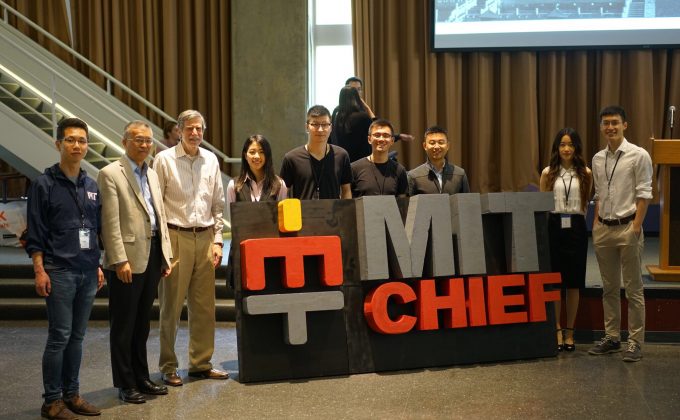MIT-China Innovation and Entrepreneurship Forum
June 6, 2017
The student-run MIT-China Innovation and Entrepreneurship Forum (MIT-CHIEF) announced its collaboration with the MIT Hong Kong Innovation Node to launch a new program, Co-founder’s Journey, on May 7. This new program builds upon MIT’s motto, “mens et manus” (“mind and hand”) and aims at providing early-stage startups at MIT with unique opportunities to dive into the innovation ecosystems in Hong Kong and the neighboring Pearl River Delta, especially to access manufacturing resources.
Tech Show, the first milestone of Co-founder’s Journey, was held at the MIT Lobdell Dining Hall on May 7, and joined by MIT-affiliated startups, alumni, and faculty. Fourteen MIT-affiliated startups teams working on hardware prototypes introduced their initial products to over 100 MIT students, faculty, alumni, and investors. This event was not only a technology show, but also a platform for innovators to present their ideas to get feedback on their product designs from potential customers and to find co-founders.
The second milestone of the journey will be in July when MIT-CHIEF will bring 10 startup teams to Hong Kong and Shenzhen, China, for week-long, on-site visits to production lines related to the domains of the teams, and hardware incubators for rapid prototyping. Dajiang Suo, co-president of MIT-CHIEF, made the announcement of collaborating with the MIT Hong Kong Innovation Node to launch Co-founder’s Journey.
Tech Show put talented student entrepreneurs in the spotlight. For example, GelSight is an MIT startup that develops novel technology for measuring high-resolution surface topography. Its product is capable of measuring surface features of an object as small as two microns spatially with submicron depth resolution. GelSight has made two prototypes based on this design, a bench configuration and a handheld portable configuration.
“Co-founder’s Journey will bring benefits to startup teams who need to build prototypes rapidly for initial testing in the market. Sometimes, negotiating with hardware suppliers thousands of miles away in Shenzhen, China can be tricky, and establishing a strong partnership with them is critical for scaling up,” said Suo. “You may fail 10 times before succeeding in your venture. But we believe it is the experience you get from this entrepreneurship journey that eventually makes your startup successful.”
MIT faculty who joined Tech Show included Charles Sodini, the Clarence J. LeBel Professor in Electrical Engineering and faculty director for the MIT Hong Kong Innovation Node; Gang Chen, head of the Department of Mechanical Engineering; and Carl Richard Soderberg, professor of Power Engineering.
Sodini introduced the long history of collaboration between MIT and Hong Kong, starting with MIT’s programs in China. “As I continuously went to Hong Kong back and forth, I realized the importance of taking advantage of the Hong Kong and Shenzhen ecosystem for prototyping and also large-scale manufacturing.” He also mentioned several ongoing activities by the node to bring students from MIT and Hong Kong universities together to go through entrepreneurship processes, making, and scaling-up by introducing them to factories and prototyping facilities.
Chen shared his personal experience of several visits to Hong Kong and Shenzhen and emphasized that Pearl River Delta is an ideal region for student entrepreneurs to learn and explore innovative ideas. He also introduced support for student entrepreneurship by the innovation ecosystem at MIT, especially for those whose products require intensive usage of advanced manufacturing facilities.
Co-founder’s Journey will bring 10 startup teams founded by MIT students or alumni to Hong Kong and Shenzhen July 4-15. The program is subsidized and MIT-CHIEF will reimburse up to $1,500 for each startup team’s round-trip international flight between the U.S. and China. The expense of local accommodation, domestic transportation, and group activities during the travel will also be fully covered.
The detailed program includes:
- One-day conference (Hong Kong): The inaugural conference in Hong Kong will provide startup teams with exposure to the local innovation ecosystem to explore unique opportunities and expand their network. Startup teams are invited to pitch and showcase their products to an executive audience of investors, startups, and academic professionals, as well as MIT alumni in the region.
- Advanced manufacturing facility tour (Shenzhen): A critical component of this journey is an in-depth factory tour in Shenzhen. The tour can provide student entrepreneurs with great opportunities of communicating with working staff in production lines, accessing state-of-the-art technologies adopted in advanced manufacturing, gaining better understanding of trade-off between design and manufacturing such as cost and precision, etc. All of these experiences will facilitate the process of rapid prototyping by startup teams.
- Workshops with local hardware “hackers”: Startup teams will get a chance to interact with hardware “hackers” in Shenzhen. They will learn more about the local innovation systems in the Pearl River Delta and enhance their skills for negotiating with hardware suppliers.
- “Light” pitches: Startups will also get opportunities to showcase their products and business models to representatives from local government, investors, and universities in Shenzhen. This will help teams better understand the customers, investment environment, policy support for companies who want to set up divisions in the Pearl River Delta, or testing prototype in the local market.



